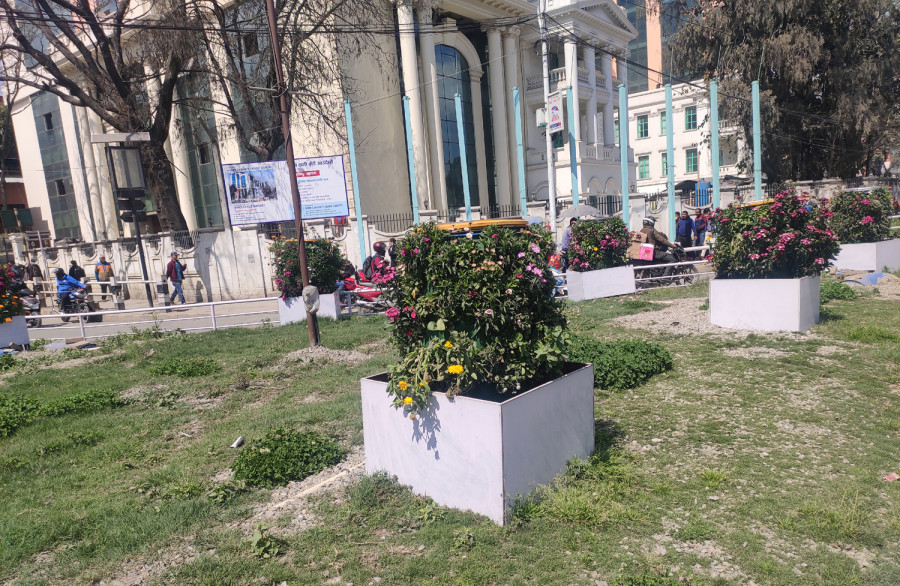Kathmandu
Kathmandu Metropolitan City fails in its attempts to beautify traffic islands with flower beds using aeroponic technology
City had implemented the new technology on the traffic islands located on New Road and in front of the City Hall, spending Rs1.4 million donated by Nabil Bank.
Anup Ojha
Last year, the Kathmandu Metropolitan City had promised to decorate the Capital’s traffic islands with colourful flowers. But so far, the city authority appears to have failed in its endeavour.
In June 2019, there was a tripartite agreement among the city office, Nabil Bank and Aero Roots Pvt Ltd, an agricultural company, to decorate Kathmandu’s traffic islands by growing flowers using aeroponic technology, in which plants and flowers are grown in a mist or air environment without the use of soil.
After the agreement, Bidya Sundar Shakya had said that flowers would be blooming on the city’s traffic islands in the next 12 months. His statement so far has proved to be wishful thinking.
The project was piloted outside the New Road Gate and the City Hall with Rs 1.4 million provided by Nabil Bank, but neither of the places has bloomed flowers. In fact, the two traffic islands where the project was piloted looks worse than before.
The traffic island on New Road holds nine drums, but the flowers are not sprouting. The place looks dirty. Similar is the state of the traffic island in front of the City Hall.
The people who run businesses close to these two traffic islands say they are not pleased with what the city authority has done in the name of the beautification project.
“If only the city workers had first cleaned up the area, this might have looked good. The city office does things just for the sake of doing things,” said Raja Mohan Shakya, who runs a business in New Road.
As the pilot project failed to reach fruition, the city officials seem unsure whether to go ahead with the project.
“It’s not the city’s money. The project was run on a trial with the help of Aero Roots, but it failed to beautify our traffic islands. We are yet to decide whether to take this project further,” said Ishwor Man Dangol, the city’s spokesperson.
However, Biplove Singh, co-founder and CEO at Aero Roots, said that the project will continue.
“The places where the project was piloted do not look as attractive because the city authority did not take any measures to stop the people from entering the traffic islands and stealing the flowers,” said Singh.
Singh added that for the project to succeed, the city authority should take the responsibility of cleaning the traffic islands and maintaining the flowers.
Though the city authority time and again plants saplings and flowers on roadsides for city beautification, it has never been able to look after the plants.
During Chinese President Xi Jinping’s Nepal visit in October last year, the city authority had built a park overnight in Tinkune, and almost all the VVIP road sections were decorated with flowers. But soon after Xi’s return, many of the flowers disappeared and others died for want of proper care.




 11.78°C Kathmandu
11.78°C Kathmandu.jpg)











